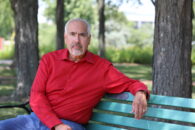JEFFERSON CITY, Mo. — A concentrated lobbying effort, new polls, and some help from the Surgeon General may just make Missouri the 24th state to legalize marijuana for medical purposes, despite Republican supermajorities in both chambers.
Bills permitting medical pot usage or legalizing the drug altogether have floated around the Missouri legislature for years, rarely making it farther than a courtesy hearing in one chamber. But this year, things are a little different. First, it’s a Republican sponsoring what supporters call the “most restrictive medical marijuana law in the country.”
Rep. Dave Hinson, R- St. Clair, is offering the bill, and is the first Republican to do so in Missouri. Hinson’s bill and its relative success may have as much to do with fortunate timing as it does with his political acumen. Hinson began working with Mark Habbas, a spokesman for Missouri’s professional firefighters and a volunteer lobbyist for Missouri for Compassionate Care. Habbas began working with Steve Tilley, a former House Republican Speaker and increasingly prolific Jefferson City lobbyist.

Enter Montel Williams. Williams, radio and television personality and, more importantly, a sufferer of multiple sclerosis. Williams’ MS comes with a great deal of pain which he says he spent years trying to alleviate before finally trying medical cannabis. Williams was astonished as its efficacy and has spent the last 15 years or so lobbying in every single state that has considered a medical marijuana law.
Williams was so passionate about the topic, he came to Jefferson City with more than just talking points. Williams descended on the Missouri capitol with a full film crew and announced his intentions to film a full-length documentary about the lobbying effort behind Missouri’s medical marijuana bill.
With plenty of eyes now on the issue, it’s been up to supporters to craft the most appealing message to lawmakers. And as the bill approaches almost certain committee approval in the House Emerging Issues committee, the message that is proving most appealing is one lifted straight from the speech of any good Republican: personal liberty.
Supporters of medical marijuana argue that its efficacy as a potentially helpful treatment for a variety of ailments is medical fact, and prohibiting its use amounts to nothing more than a needless government restriction on your healthcare.
Earlier this month, U.S. Surgeon General Vivek Murthy, said research showed that “marijuana can be helpful” for a variety of medical conditions, and suggested that increasing data showing its use needs to be driving public policy behind the plant. Earlier this year, the Journal of the American Medical Association published a study saying that between 1999-2010, states with medical marijuana laws had a full 25 percent fewer overdoses caused by prescription painkillers than other states.
In January, the American Academy of Pediatrics recognized that marijuana had medical value for certain debilitating ailments, and a group of the AAP’s committee on substance abuse has officially called for the drug to be reclassified by the federal government to spur “vital” medical research.
The statements mark a significant shift in federal attitudes toward marijuana in 2015 — when so far at least 10 states have introduced bills legalizing medical marijuana — and reflect the changing public opinion on the issue.
A recent poll conducted by Republican polling firm, Remington Research Group, found roughly 67 percent of likely voters would support a medical marijuana law in Missouri and only about 25 percent of likely voters would vote against a candidate who supported medical marijuana.
Nationally, about 80 percent of Americans favor medical marijuana laws, and Missouri’s numbers are likely to go up once they see just how restrictive Hinson’s bill is. Matt Cook, who was the architect of Colorado’s medical marijuana law and a former senior director of enforcement for the Colorado Department of Revenue and it’s medical marijuana system, said Missouri’s bill was the result of several other states having already moved forward and seen what works, and what doesn’t.
Cook said Hinson’s bill was a “compilation” of the best medical marijuana laws around the country.
“The key when you do these things is to validate the new and emerging industry while also preserving and upholding public safety,” Cook said. “For medical marijuana that means diversion and limiting youth access. You don’t want a regulatory structure that competes with the black market or forces people into it. You want a structure that eliminates it.”
Missouri’s bill has a laundry list of restrictions not found in other states. If passed, the state of Missouri will only license a total of 30 businesses to disburse medical marijuana directly to a patient, and the locations must be equally geographically disbursed. The bill also limits the number of plants that may be grown, charges the state with overseeing the growth and transportation of the plants, limits the specific ailments that marijuana may be prescribed to treat, and has a minimum requirement of half a million dollars in assets for any individual or business seeking a new marijuana distribution license. The bill’s numerous restrictions are so vast, some individuals and groups supporting less restrictive marijuana laws are meeting the bill with only lukewarm support, while medical practitioners and patients are quietly hoping for a win.
The bill has enough restrictions to likely leave it’s current committee with well more than a simple majority of votes. The bill is then poised for the House Select Committee on General Laws, which is chaired by Rep. Caleb Jones. Jones worked with Sen. Eric Schmitt last year to legalize use of Cannabidiol — an oil derived from the cannabis plant — for children with certain types of epilepsy.
Opponents of the legislation tout a series of not unreasonable talking points, the most effective of which may be that marijuana usage among teenagers is highest in states with medical cannabis, and that no other drug has ever become publicly available by having states reclassify them in the face of continued federal prohibition. Most of Missouri’s law enforcement agencies declined to testify one way or another when Hinson’s bill had its first hearing, though law enforcement officials that were present indicated that they believed there was a high level of abuse of the medical marijuana system.
The Missouri Narcotics Officer’s Association, the lone law enforcement agency to formally testify against Hinson’s bill in committee, did not immediately respond to requests for comment.







